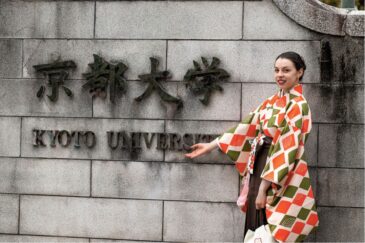Scholars' Experiences (Daiwa Scholars in Japanese Studies)
Becki Paterson (2018)

Rebecca at her master’s degree graduation ceremony at Kyoto University
My master’s degree was a taught course that gave a firm foundation in the study of language acquisition and learning.
This was particularly helpful since my thesis focused on reflection strategies as a way to help improve speaking outcomes.
Following my master’s degree, I decided to continue my education at Kyoto University, and begin my PhD, albeit at a different faculty – the Division of Educational and Cognitive Psychology at the Faculty of Education.
My research focus has shifted slightly to the cognitive mechanisms of foreign language speaking anxiety such as the issues of attention and cognitive load.
In order to support myself financially and to gain experience in academia, I am also teaching English at both Kyoto Notre Dame University and Kyoto Prefectural University where I teach speaking-heavy courses according to my own curriculum.
Here, I have many opportunities to utilise my Japanese skills to ensure that my students are engaged and fully understand. Furthermore, I see myself as a role model for others in having mastered Japanese as a foreign language and in having been successful as a young woman in my career in Japan where women’s career opportunities are limited.
Written in June 2021
Elizabeth Wormald (2016)

At the Yayoi Kusama: My Eternal Soul exhibition at The National Art
Center in Tokyo in 2017
As a Daiwa Scholar in Japanese Studies I undertook an MA in International Culture and Communications Studies, specialising in Visual Culture, at Waseda University. I focussed my research on Japanese women photographers, analysing their use of self-portraiture as a tool to disrupt the traditional male gaze in Art History.
Following my graduation in spring 2019 I found an internship at Christie’s Japanese Art Department, London, where I developed my understanding of the art market, and learnt a great deal about Ukiyo-e. In August 2019 I began a full-time position at Roseberys Fine Art Auctioneers where I work between the Japanese Department and the Prints and Multiples Department as a Junior Cataloguer. My studies have allowed me to work professionally with two specialisms – both Japanese fine art and contemporary international art, working with pieces by a range of artists from Hokusai and Yayoi Kusama to Picasso and Bridget Riley.
Written in June 2020
Harriet Cooke (2017)
 During my two years as a Daiwa Scholar in Japanese Studies, I lived in Tokyo, studying an MA in International Relations at the Graduate School of Asia-Pacific Studies, Waseda University.
During my two years as a Daiwa Scholar in Japanese Studies, I lived in Tokyo, studying an MA in International Relations at the Graduate School of Asia-Pacific Studies, Waseda University.
My research focused on influencing factors on Japanese womens’ choices on birth and child-rearing, guided by Life Course theory. I interviewed nine women from the Greater Tokyo area, and through these interviews found evidence to support the presence of gender constraints which had and continue to have, a significant impact on the lives of my informants. Despite recent steps by the Japanese government to reform the workplace, these were deemed as ineffective ‘band-aid ‘policies that did little to address the underlying issues of tekireiki age norms and social pressures that equated marriage with motherhood and working full-time as incompatible with child-rearing.
Following my graduation from Waseda, I was invited to present the findings of my thesis at the British Association of Japanese Studies conference at Sheffield University in September 2018. It was a delight to be able to return to the university where I first studied Japanese at undergraduate, and a privilege to be able to present my research to faculty members who had previously taught me and to meet so many fantastic specialists in the Japanese Studies field.
Currently, I work at Hitachi Rail, Ltd., as a Business Management Graduate, responsible for M&A origination, transaction management, strategy mapping and KPI analysis.
Written in June 2019
Thomas Monaghan (2016)
 Thomas Monaghan, a 2016 Daiwa Scholar in Japanese Studies, recently completed his year at Tokyo University as a Postgraduate Foreign Research Student. He has an MA (Scot) in History from the University of Edinburgh and an MA in Japanese Studies with Intensive Language from SOAS, University of London. Between degrees he spent two years in Naoshima, Kagawa Prefecture as an Assistant Language Teacher on the Japan Exchange and Teaching (JET) Programme.
Thomas Monaghan, a 2016 Daiwa Scholar in Japanese Studies, recently completed his year at Tokyo University as a Postgraduate Foreign Research Student. He has an MA (Scot) in History from the University of Edinburgh and an MA in Japanese Studies with Intensive Language from SOAS, University of London. Between degrees he spent two years in Naoshima, Kagawa Prefecture as an Assistant Language Teacher on the Japan Exchange and Teaching (JET) Programme.
While in Japan, Thomas explored the significant historical role that the Satsuma Domain (present-day Kagoshima) played between 1830 and 1877 in the overthrow of the Tokugawa Shogunate and the establishment of the Meiji Government. He researched the origins and paths of Satsuma’s modernising leadership on the one hand, symbolised by Nariakira Shimadzu (1809-1858), the promoter of Satsuma’s early industrialisation, and reactionary militarism on the other, represented by the violent backlash in 1877 against the Meiji government’s modernising reforms. Thomas’s PhD at Yale is further delving into why Satsuma followed a separate path to the rest of Japan and what this reveals about the nature of the Japanese polity during the upheavals of the 19th Century.
Written June 2017
Kara Juul (2015)
 Kara successfully completed her MPhil in Modern Japanese Studies in 2016, and is in the second year of her DPhil at St Antony’s College, Oxford. Her research explores the ‘gender gap’ in mathematics achievement and advancement in Japan, particularly focussing on how key stakeholders such as teachers and educational policymakers understand this issue. Japan provides an interesting conundrum: it scores highly in international benchmarking tests for mathematics such as PISA and TIMSS (15 year olds), yet girls underperform significantly compared to their male classmates and have much lower levels of self-confidence and interest in mathematics.
Kara successfully completed her MPhil in Modern Japanese Studies in 2016, and is in the second year of her DPhil at St Antony’s College, Oxford. Her research explores the ‘gender gap’ in mathematics achievement and advancement in Japan, particularly focussing on how key stakeholders such as teachers and educational policymakers understand this issue. Japan provides an interesting conundrum: it scores highly in international benchmarking tests for mathematics such as PISA and TIMSS (15 year olds), yet girls underperform significantly compared to their male classmates and have much lower levels of self-confidence and interest in mathematics.
As part of her research Kara investigates why, despite a goal of the ‘Abenomics’ strategy being to encourage women into economically vital STEM (science, technology, engineering and mathematics) professions, the gender gap in mathematics attitudes and achievements seems to have been largely ignored by many levels of Japanese society. Kara has recently completed her second round of fieldwork and is planning her third.
Written June 2018